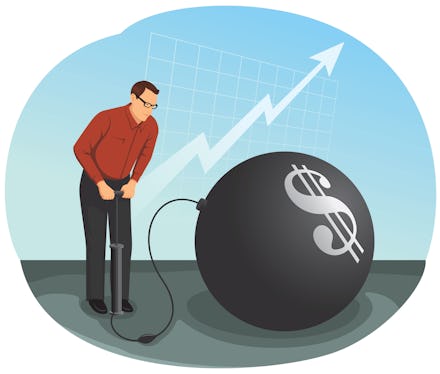Venezuela's soaring prices now officially count as hyperinflation: Here's what that means

Venezuela has officially been entered into the Hanke-Krus World Hyperinflation Table — a definitive ranking of periods of hyperinflation — becoming just one of 57 documented cases since the first official instance in 1795, during the French Revolution. Venezuela is the only nation in the world currently experiencing hyperinflation.
The country qualified on Dec. 3, after 30 consecutive days of total inflation higher than 50%.
The monthly inflation rate peaked at 221%, with a daily inflation rate of nearly 4%, according to a new paper examining Venezuela's hyperinflation — and published on the day it officially entered the record books.
Authored by Johns Hopkins University professor of applied economics Steve Hanke and research assistant Charles Bushnell, the paper provided some damning conclusions.
"Venezuela, welcome to the record books. You have now entered the inglorious sphere of hyperinflation," the paper reads. "It is a world of economic chaos, wrenching poverty, and death. Its purveyors should be incarcerated, and the keys should be thrown away."
On Monday, Venezuela's government announced that the nation's largest bill, the 100 bolivar note, would be taken out of circulation and replaced with a higher value note by Wednesday.
People will then have 10 days for people to exchange their 100 bolivar bills — which has a value of just two American cents on the black market — at the bank, which many argue is insufficient time.
The announcement was accompanied by sealing the country's border with Colombia.
"I have taken the decision to close the border with Colombia for 72 hours," President Nicolas Maduro told the country, according to Agence France-Presse.
Maduro — who has inherited many of the economic policies of his controversial predecessor, Hugo Chavez — has accused "mafias" backed by the United States Department of Treasury of trying to "destabilize" the Venezuelan economy by hoarding 100-bill notes.
The closure of the border and elimination of the notes would help combat this alleged collusion, Maduro contends.
But economists argue that — with more than six billion 100-bolivar bills in circulation — removing the 100-bolivar bill is an economically problematic move, and it will do little to combat what has become the world's biggest inflation crisis.
Reports of food shortages in Venezuela surfaced throughout 2016 and what government-subsidized food there is available is being reserved for Maduro supporters.
The healthcare system is also unraveling as a consequence of the collapsing economy. A third of hospital patients end up dying, and there are shortages of 85% of types of medicines, the Associated Press reported.
Maduro's inadequate response has left much of the country consumed by panic and chaos, while the president maintains that external forces and nefarious actors are to blame for the crisis.
The government seized 4 million toys from one of Venezuela's biggest merchandisers, Kreisel, on Friday, for example, alleging the company had been systematically amassing and hiding toys in order to mark up the prices by 54,000%, according to the Miami Herald. The government plans on selling those toys at "fair prices."
Other past examples of hyperinflation show that dramatic changes by government are often necessary to end crises: After Yugoslavia experienced spiraling price increases during the 1990s, incomes dropped by more than 50% and the nation's currency had to be replaced.